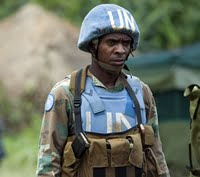GOMA, Democratic Republic of Congo -- Were it not for the convoys of blue-helmeted soldiers, one would hardly guess this lakeside town is the nexus of one of the world's worst humanitarian crises.
Though its rutted streets are a stark contrast to the newly surfaced, tree-lined avenues across the nearby Rwandan border, the capital of eastern Congo's North Kivu Province is abuzz with new construction, a testament to Goma's status as a bastion of stability in a region defined by conflict. On a recent Friday night, cigarette-smoking ex-pats downed Primus beers at Petite Bruxelles, a kitsch new establishment and ode to Congo's Belgian colonizer. Half a mile down the road, wedding-goers danced until early hours at the lakeside Ihusi Hotel -- the shiny SUVs in the parking lot belying the estimated 1,300 people that continue to die each day as a consequence of war in the Congo.
As bad as the situation in eastern Congo is outside of Goma's urban refuge, analysts fear it may soon be worse. With the country's 50th anniversary of independence to be celebrated this June, and a presidential election scheduled for 2011, President Joseph Kabila has called for a withdrawal of Congo's 20,000 U.N. peacekeepers. They are there as part of the 11-year-old MONUC mission, the world's largest peacekeeping operation. Heeding his demand, U.N. Special Representative to Congo Alan Doss last month presented the U.N. Security Council with a proposed timetable for a mission drawdown to begin next month, and to be completed by June 2011.

